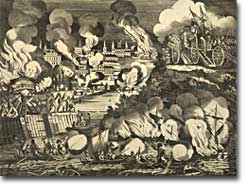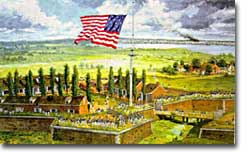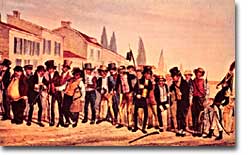21e. The Second War for American Independence

This engraving, The Taking of the City of Washington in America, illustrates British forces storming Washington D.C. in 1814 and burning several significant structures including the White House and the Library of Congress.
In the War of 1812 the United States once again fought against the British and their Indian allies. Some historians see the conflict as a Second War for American Independence.
Furthermore, the three-year war marks a traditional boundary between the early republic and early national periods. The former period had strong ties to the more hierarchical colonial world of the 18th century, while post-war developments would move in dynamic new directions that contributed to a more autonomous American society and culture. Although the War of 1812 serves as an important turning point in the development of an independent United States, the war itself was mostly a political and military disaster for the country.
The U.S. Congress was far from unanimous in its declaration of war. America's initial invasion of Canada (then ruled by England) in the summer of 1812 was repulsed by Tecumseh and the British. Although Tecumseh would be killed in battle the following fall, the U.S. was unable to mount a major invasion of Canada because of significant domestic discord over war policy. Most importantly, the governors of most New England states refused to allow their state militias to join a campaign beyond state boundaries. Similarly, a promising young Congressman from New Hampshire, Daniel Webster, actually discouraged enlistment in the U.S. army.

Fort McHenry is considered the "Home of the National Anthem" because it was here, during a battle in the War of 1812, that Francis Scott Key was inspired to write his famous poem.
British military dominance was even clearer in the Atlantic and this naval superiority allowed it to deliver a shaming blow to the fragile United States in the summer of 1814. With Napoleon's French forces failing in Europe, Britain committed more of its resources to the American war and in August sailed up the Potomac River to occupy Washington D.C. and burn the White House. On the edge of national bankruptcy and with the capital largely in ashes, total American disaster was averted when the British failed to capture Ft. McHenry that protected nearby Baltimore.
Watching the failed attack on Ft. McHenry as a prisoner of the British, Francis Scott Key wrote a poem later called "The Star-Spangled Banner" which was set to the tune of an English drinking song. It became the official national anthem of the United States of America in 1931.
The most critical moment of the War of 1812, however, may not have been a battle, but rather a political meeting called by the Massachusetts legislature. Beginning in December 1814, 26 Federalists representing New England states met at the Hartford Convention to discuss how to reverse the decline of their party and the region. Although manufacturing was booming and contraband trade brought riches to the region, "Mr. Madison's War" and its expenses proved hard to swallow for New Englanders.
Holding this meeting during the war was deeply controversial. Although more moderate leaders voted down extremists who called for New England to secede from the United States, most Republicans believed that the Hartford Convention was an act of treason.

State militia in New England refused to go into national service during the War of 1812.
Federalist New England's opposition to national policies had been demonstrated in numerous ways from circumventing trade restrictions as early as 1807, to voting against the initial declaration of war in 1812, refusing to contribute state militia to the national army, and now its representatives were moving on a dangerous course of semi-autonomy during war time.
If a peace treaty ending the War of 1812 had not been signed while the Hartford Convention was still meeting, New England may have seriously debated seceeding from the Union.






